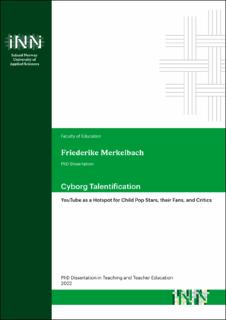| dc.contributor.author | Merkelbach, Friederike | |
| dc.date.accessioned | 2022-02-08T11:56:41Z | |
| dc.date.available | 2022-02-08T11:56:41Z | |
| dc.date.issued | 2022 | |
| dc.identifier.isbn | 978-82-8380-317-4 | |
| dc.identifier.isbn | 978-82-8380-318-1 | |
| dc.identifier.issn | 2464-4390 | |
| dc.identifier.issn | 2464-4404 | |
| dc.identifier.uri | https://hdl.handle.net/11250/2977700 | |
| dc.description | © Friederike Merkelbach (2022).
This material is protected by copyright law. Without explicit authorization, reproduction is only allowed in so far it is permitted by law or by agreement with a collecting society. | en_US |
| dc.description.abstract | Denne kvalitative, netnografiske kasus-studien undersøker om musikalsk talent kan være samskapt, et fenomen jeg har beskrevet som talentifisering. Hotspot i denne undersøkelsen er YouTube, hvor fans og kritikere deler sine musikalske opplevelser og talentoppfatninger i møte med utvalgte norske barne-popstjerners fremføringer. Kyborgteori ble introdusert for å beskrive sammenfiltringen av menneske og maskin på plattformen. YouTube ble dermed forstått som et kyborgsystem, og talentifisering ble i min studie omdefinert til kyborg talentifisering, eller cyborg talentification, som er betegnelsen brukt i avhandlingen. Kulturkosmopolitisk teori og maktstrukturer komplementerer det teoretiske rammeverket. YouTube kommentarfelt, musikkvideo og intervjuutdrag med popstjernene delt på YouTube, utgjør det empiriske materialet. Basert på generelle etiske retningslinjer, og ved å betrakte internettet som en tekst og ikke et rom, ble denne studien utført uten samtykke og kun basert på offentlig tilgjengelige data. Siden offline erfaringer viste seg å påvirke mine online forståelseshorisonter, inkluderte jeg en live-konsertopplevelse. Denne autoetnografiske studien ble brukt til å belyse kjennetegn ved cyborg talentification på YouTube, men også til å problematisere online/offline dualismen, som ble videre undersøkt og dekonstruert av kyborgteori. Analysen av YouTube-data avdekket motivasjonsbaserte, diskursive, narrative og kulturkosmopolitiske perspektiver ved cyborg talentification. I diskusjon med eksisterende talentforskning og annen relevant litteratur ble det avdekket ulike synspunkter på talent og vidunderbarn-image hos YouTube-brukerne, media og barnestjernene selv. Barnestjernene viste seg å være fanget mellom divergerende forventninger om barnlig uskyld, autentisitet, ekstraordinær modenhet og originalitet. Disse motsetningene, som ble forsterket av YouTubes arkivfunksjoner, problematiserte barnestjernenes nåværende status og overgangen fra barnestjerne til voksen artist. Samtidig både bekreftet og utfordret barnestjernenes fortolkende reproduksjon av popmusikk den generelle infantiliseringen og foryngelsestrenden (youthification) av popkultur.
Jeg har gjennomgående diskutert denne studiens relevans for det musikkpedagogiske forskningsfeltet. Dette innebar å belyse YouTube som en uformell læringsplattform og tilrettelegger for digital Bildung, samt å vurdere bidraget av cyborg talentification til eksisterende diskurser om musikalsk talent i formelle musikkpedagogiske rammer og læreplaner. Videre ble funnene fra YouTube om medieindustriens innvirkning og syn på barnestjerner satt i et musikkpedagogisk forskningsperspektiv. | en_US |
| dc.description.abstract | Abstract:
This qualitative, netnographic case study anticipates the cocreation of musical talent, a phenomenon I conceptualized as talentification. The hotspot of this investigation is the YouTube platform, on which fans and critics alike share their musical experiences and perceptions of talent related to selected Norwegian child pop stars’ performances. Cyborg theory was introduced to elucidate the entanglement of human and machine. Thus, YouTube was conceptualized as a cyborg system, and talentification was subsequently reconceptualized as cyborg talentification. Cultural cosmopolitan theory and power structures complemented my theoretical framework. The empirical materials comprised YouTube comment rooms, their adjoining YouTube music videos, and YouTube interview footage starring the young celebrities. Regarding the internet as text rather than space, and based on ethical standards for online research, this investigation was solely conducted with publicly accessible material that obviated the need to seek consent. As offline experiences were found to inform my online understandings, I included a live concert visit. This autoethnographic experience proved valuable not only in pinpointing the characteristics of cyborg talentification on YouTube but also in shedding light on the online–offline binary, which was further investigated and deconstructed by cyborg subjectivity. The analysis of YouTube materials identified motivational, discursive, narrative, and cultural cosmopolitan levels in the cyborg talentification processes. In close discussion with existing scholarship on talent and adherent research, divergent views on talent and prodigiousness in commenters’, the media’s, and in child stars’ own voices were unpacked. The child stars were found to be caught between contrasting expectations of innocence, authenticity, mature extraordinariness, and originality, which, supported by YouTube’s archival functions, problematized both their present status and their transition from child pop star to adult artist. At the same time, the young celebrities’ interpretive reproduction of pop performance confirmed, but also challenged, the general proclivity of infantilization and youthification of popular culture.
Throughout, I have discussed the topic’s impact on the field of music education research. This included a consideration of YouTube as an informal learning platform and facilitator of online Bildung, and of the conceptual and practical contributions of cyborg talentification to discourses on musical talent, formal music education practices, and curricula. Furthermore, the findings gleaned from YouTube on the media industries’ view of and influence on child stars were situated in a music education research perspective. | en_US |
| dc.language.iso | eng | en_US |
| dc.publisher | Høgskolen i Innlandet | en_US |
| dc.relation.ispartofseries | Ph.d.-avhandling i profesjonsrettede lærerutdanningsfag;23 | |
| dc.relation.ispartofseries | PhD in Teaching and Teacher Education;23 | |
| dc.subject | YouTube | en_US |
| dc.subject | Barnestjerner | en_US |
| dc.subject | kyborg talentifisering | en_US |
| dc.subject | kyborgteori | en_US |
| dc.subject | popmusikk | en_US |
| dc.subject | child pop stars | en_US |
| dc.subject | cyborg talentification | en_US |
| dc.subject | cyborg theory | en_US |
| dc.subject | pop music | en_US |
| dc.subject | musikkpedagogisk forskning | en_US |
| dc.subject | music education research | en_US |
| dc.title | Cyborg Talentification: YouTube as a Hotspot for Child Pop Stars, their Fans, and Critics | en_US |
| dc.type | Doctoral thesis | en_US |
| dc.description.version | publishedVersion | en_US |
| dc.subject.nsi | VDP::Samfunnsvitenskap: 200::Pedagogiske fag: 280 | en_US |
| dc.source.pagenumber | 313 | en_US |
